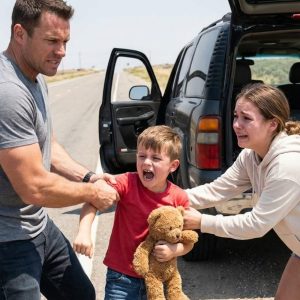My 6-year-old granddaughter climbed into my bed that night and whispered, trembling, “Grandma… tonight my parents are going to take all your money.”
I froze, a sharp, sudden pain cutting through my chest. My heart pounded as I stared at the ceiling, listening to the tick of the old clock on my nightstand. Each second seemed to stretch longer than the last. How could this be happening? My daughter Julia and her husband Mark, people I had trusted all my life, and my sweet little Lily… caught in something I never imagined.
Emma Carter—me—had known for a long time that Mark could be reckless with money. He had always been impulsive, often brushing off bills or investments as if they were minor inconveniences. Julia had a kind heart, but she could be easily persuaded, especially when she wanted to keep peace at home. And yet, hearing Lily’s fearful whisper, I realized the truth was far worse than I’d imagined.
I lay awake that night, my mind racing, thinking of the life I had built. Every penny in my accounts was the result of decades of hard work, sacrifices, and careful planning. My husband had passed years ago, leaving me to manage everything alone. Now, someone had decided they could manipulate the situation, and a child had been dragged into the fear.
By dawn, my decision was made. I couldn’t let them touch my savings. I couldn’t let Lily carry the weight of lies or theft. I logged into my accounts, reviewed all the paperwork, and carefully transferred every last cent—not to Julia or Mark, but to Michael Carter, my late husband’s brother. He had always been honest, trustworthy, and careful with money, and I knew my assets would be safe in his hands.
Breakfast was quiet that morning. But it didn’t last. Moments later, the entire family burst into my bedroom, anger and confusion written on their faces. “Mom! What did you do?” Julia demanded, her voice sharp, though tinged with fear. Mark’s jaw tightened, his usual bravado faltering under my calm gaze. Even Lily, still in pajamas, clung to the doorframe, wide-eyed.
I sat on the edge of my bed, folding my hands neatly in front of me. “I’ve transferred all the money to the one who truly deserves it,” I said calmly.
Shock rippled across the room. Faces drained of color. Mark’s fists clenched, but he said nothing. Julia’s lips trembled. Lily’s small hands clutched at my nightgown, unsure of what to say.
“You can’t just do that, Emma!” Mark finally spat, trying to sound authoritative.
I met his eyes steadily. “It’s my money. And judging by last night, I wasn’t meant to find out about your plans, was I?”
Julia’s cheeks burned red, and she looked down at the floor. “It’s a misunderstanding, Mom. We were just talking. Lily must have misheard.”
But the truth glimmered in her eyes, and in Lily’s silent tears.
I took a slow breath. “You’re forgetting something. I wasn’t always old. I worked forty years for that money. I paid bills. I survived losing your father. I raised you. And now, you think I would just hand it over because you’re in a tight spot?”
Mark’s face darkened. “We were counting on your help!”
“I’m not angry because you needed help,” I said, voice firm but quiet. “I’m angry because you tried to take advantage of me.”
Julia’s eyes filled with tears, shame overtaking any defensive instinct. Mark opened his mouth to argue, but I raised a hand. “No. You need to get your finances in order. And you need to protect Lily from conversations she has no business hearing.”
There was no shouting. No dramatic outburst. Only the heavy, suffocating silence of consequences settling in.
In the following days, something unexpected happened. Instead of collapsing under the weight of their mistakes, Julia and Mark began taking responsibility. I insisted on boundaries—not from spite, but necessity. I suggested financial counseling. Reluctantly, they agreed. Losing access to my money had forced them to confront realities they had been avoiding for far too long.
I temporarily moved in with Michael. It wasn’t because I feared my family, but because I needed clarity and space to think. Michael welcomed me with kindness, never criticizing Julia or Mark, only offering gentle perspective. “People panic when they feel cornered,” he said. “It doesn’t excuse their behavior, but it explains it.”
Over the next few weeks, Julia’s visits began to feel less like penance and more like rebuilding bridges. Short at first, tense, filled with apologies and quiet tears, they gradually transformed into genuine conversations. Mark joined occasionally, humbled, quieter than I had seen him in years. He admitted his financial recklessness and even signed up for online business courses to better understand what he had mishandled.
Lily, for her part, blossomed. Without tension at home, she grew cheerful again, her laughter filling rooms instead of muffled whispers of fear. She drew pictures for me, little reminders that life could return to its gentle rhythm, despite the chaos of the past weeks.
I kept my distance financially, but I offered emotional support when I could. And slowly, a new sense of respect grew between Julia, Mark, and me. They learned what it meant to value honesty and trust, not just convenience. They learned that my money was not theirs to take, but that my guidance and support would remain, provided they acted responsibly.
Eventually, I returned home on my own terms. The atmosphere felt different—more cautious, yes, but also more thoughtful. Julia involved me in decisions again, with transparency. Mark expressed gratitude instead of expectation. The incident that could have fractured us instead became a turning point.
Standing in my kitchen one afternoon, watching Lily hum softly while coloring at the table, I felt a quiet sense of peace. What could have been betrayal had turned into a lesson, hard-earned but transformative. The family was still imperfect, but for the first time in a long while, it felt like we were moving forward together—healing, humbled, and more aware of what truly mattered.
Sometimes, I realized, love isn’t about giving blindly. It’s about setting boundaries, standing firm, and protecting the people we care about—especially when the world feels uncertain. And that night, when Lily whispered her fear into the darkness, I had learned the value of listening, trusting intuition, and acting decisively.
Because in the end, family isn’t just about blood. It’s about trust. And trust, once broken, can only be rebuilt with honesty, courage, and unwavering love.




